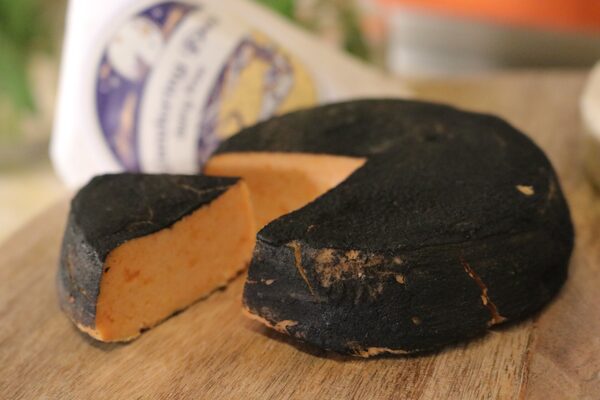
Founded in 2018, Vancouver’s Blue Heron Creamery sells around 40 varieties of plant-based cheese.Colin Medhurst
To the uninitiated, the phrase “vegan cheese" might seem like a food oxymoron along the lines of “fat-free creamer” or “boneless spareribs.” To others, it may conjure an image of the health food section of the supermarket, where unidentified yellow substances sit in plastic bags next to packets of tofurkey and tempeh.
But for a new wave of vegan cheesemakers across the country, there’s nothing off-putting or confusing about plant-based cheese. In fact, they’re out to conquer Canada’s cheeseboards with high-quality, full-flavour, artisanal products.
For former scientist and dairy cheese lover Lynda Turner, who runs Fauxmagerie Zengarry in Alexandria, Ont., the social importance of cheese is the key to understanding the rise of plant-based alternatives.
“When you're going to a Christmas party or a wedding or any kind of big celebration, there's always a cheese plate,” she says. “I always used to have a tradition of cheese and wine nights with the girls. It's something that is really worked into our lives. And it sucks to feel like you're missing out on that.”

Lynda Turner runs Fauxmagerie Zengarry in Alexandria, Ont., which makes a range of cashew-based cheeses.Handout
Zengarry, which launched in 2013 and recently completed a major expansion of its production facility, makes its cheeses from cashews, including a double crème, a Swiss-style and several varieties flavoured with locally grown herbs.
“The market has definitely exploded and people are doing more exciting things,” Turner says. “The availability of products has come so far. Plant-based used to be a category at health-food stores, but now you’re starting to see mainstream groceries developing a vegan section.”
Vegan cheese can be made in a variety of ways, the base protein is usually a nut or lentil mixture, to which bacterial cultures are added.
Karen McAthy, author of The Art of Plant-Based Cheesemaking, experimented for years with methods adopted from traditional cheesemaking before opening Vancouver’s Blue Heron Creamery in 2018. She now sells around 40 varieties of plant-based cheese on a rotating basis, employing different bacterial cultures, as well as time-tested techniques such as aging, the addition of mould and washing rinds with brine or beer. For her, vegan cheese is part of a grand tradition that just happens to be made from new ingredients.
“That has been my premise from the very beginning,” she says. “I’m interested in breaking open the boundary of what’s called cheesemaking. That doesn’t mean putting nutritional yeast and cashews in a blender. I don’t discount that necessarily, but I’m interested in the craft of cheesemaking that has been practised for centuries and wanting to extend that into new material.”

Blue Heron's Karen McAthy uses traditional cheese-making techniques such as rind-washing and the additional of mould.Colin Medhurst
Unfortunately for McAthy and others in the burgeoning industry, Canadian food authorities have not always taken the same view. In 2019 the Canadian Food Inspection Agency ordered that Blue Heron stop using the word “cheese,” which under CFIA regulations referred only to dairy-based products. Zengarry faced a similar situation in 2015. Both were eventually given permission to use variations on the phrase “dairy-free cheese,” as well as hyphenated modifiers (i.e. cheddar-style, Swiss-style) to describe their products.
But for the new wave of artisanal vegan cheesemakers, questions about imitation miss the point. They’re not trying to fool anyone, they say, they’re trying to create foods that are enjoyable in their own right.
Kira Lancaster, owner of Toronto’s Wandering Deli, believes that if anything, vegan cheese is the opposite of the well-publicized trend toward ever more elaborately manufactured plant-based substitutes such as Beyond Meat and the Impossible Burger.

The Smoky Paprika Ash is one of Wandering Deli's most popular products.
“It is a real food, it is a real food experience, it is not in this faux-food territory,” she says. “It’s natural, it’s much more time-consuming to make, it has ingredients that are actual plants that grow.
“That’s important to me because I want people to have a recognizable experience, but I want people to have an experience that feels enriching on its own without having to be a mock version of something else.”
That strategy seems to be working: After building a following on the Toronto farmers’ market circuit, Wandering Deli launched a successful crowdfunding campaign last year and will open a permanent retail location in February.
Lancaster is even confident that her cheeses – especially the popular and photogenic Smoky Paprika Ash, made of cashews and coconut kefir – are gaining a following among non-vegans.
“If you’re wary of trying a vegan cheese, why not try something that’s a vegan cheese unto itself, as opposed to looking for it to be exactly like a dairy experience?” she says. “At farmers markets we have lots of folks who obviously eat a regular omnivorous diet who buy it all the time. They’re just like, ‘I love food, this is good, I will eat this.’”
Plan your weekend with our Good Taste newsletter, offering wine advice and reviews, recipes, restaurant news and more. Sign up today.